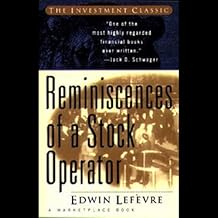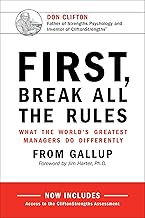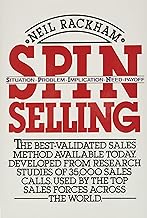
So Good They Can't Ignore You: Why Skills Trump Passion in the Quest for Work You Love
Cal Newport, Dave Mallow, et al.
4.5 on Amazon
37 HN comments

The Richest Man in Babylon: Original 1926 Edition
George S. Clason , Charles Conrad, et al.
4.7 on Amazon
37 HN comments

Basic Economics
Thomas Sowell
4.8 on Amazon
35 HN comments

Reminiscences of a Stock Operator
Edwin Lefevre, Rick Rohan, et al.
4.6 on Amazon
35 HN comments

First, Break All the Rules: What the world's Greatest Managers Do Differently
Jim Harter, Marcus Buckingham , et al.
4.6 on Amazon
34 HN comments

Venture Deals: Be Smarter Than Your Lawyer and Venture Capitalist
Brad Feld and Jason Mendelson
4.7 on Amazon
31 HN comments

Delivering Happiness
Tony Hsieh
4.6 on Amazon
30 HN comments

SPIN Selling
Neil Rackham
4.5 on Amazon
30 HN comments

Nickel And Dimed: On (Not) Getting By In America
Barbara Ehrenreich
4.3 on Amazon
29 HN comments

The Five Dysfunctions of a Team: A Leadership Fable
Patrick Lencioni
4.6 on Amazon
28 HN comments

The Startup Owner's Manual: The Step-By-Step Guide for Building a Great Company
Steve Blank and Bob Dorf
4.5 on Amazon
27 HN comments

Give and Take: A Revolutionary Approach to Success
Adam M. Grant PhD, Brian Keith Lewis, et al.
4.6 on Amazon
25 HN comments

Titan: The Life of John D. Rockefeller, Sr.
Ron Chernow
4.7 on Amazon
23 HN comments

The Challenger Sale: Taking Control of the Customer Conversation
Matthew Dixon and Brent Adamson
4.5 on Amazon
22 HN comments

Security Analysis: Principles and Techniques
Benjamin Graham and David Dodd
4.7 on Amazon
22 HN comments
vladmkonDec 8, 2020
rwieruchonDec 20, 2017
- [0] https://www.robinwieruch.de/lessons-learned-give-and-take/
rwieruchonNov 29, 2017
- [0] https://www.robinwieruch.de/lessons-learned-give-and-take/
truelsononApr 15, 2014
a2kadetonApr 15, 2014
curuinoronSep 17, 2018
jkuriaonMay 25, 2017
skmurphyonApr 19, 2020
“One of the best things you can do is call someone else facing a similar problem and talk them through it. When you talk other people through their problems, you come up with wiser perspectives and solutions for yourself.”
Adam Grant, author of "Give and Take"
JSeymourATLonDec 15, 2014
"How can I best help you?" Asked with the sincere intention to be of some assistance.
Incidentally, great book recommendation, Give and Take: A Revolutionary Approach to Success. http://www.goodreads.com/book/show/16158498-give-and-take
ldboothonMar 8, 2021
virjogonDec 22, 2016
Ask GaryVee by Gary Vaynerchuk
Deep Work by Cal Newport
Give and Take by Adam Grant
Smarter, Faster, Better by Charles Duhigg
rwieruchonAug 6, 2017
- [0] https://www.robinwieruch.de/lessons-learned-give-and-take/
OliverJonesonJuly 16, 2020
When somebody helps me out, I say to their manager, "when you get a chance please tell them I'm grateful for their good work."
Was it their distinguished expertise that made it possible for them to help me? Was it a spirit of collegiality? From my perspective, I don't care when I thank them. They did me a favor, I'm happy, I'm grateful.
Give and Take is a book by Adam Grant on this part of the workplace. https://www.worldcat.org/title/give-and-take-the-revolutiona...
truelsononNov 13, 2015
m0lluskonMay 9, 2019
rwieruchonJuly 8, 2017
- [0] https://www.robinwieruch.de/lessons-learned-give-and-take/
- [1] https://www.robinwieruch.de/lessons-learned-deep-work-flow/
- [2] https://www.goodreads.com/review/list/63553187-robin-wieruch...
jetsnoconOct 31, 2016
Author here. Thanks! That's a great suggestion. As you can tell, right now the site and the mailing list is the most minimal of an implementation. We want to build a network, connect and mentor one another through the simplest and easiest mechanism possible - email. Once we have a medium-sized community with dozens of experts, we plan to add community managed content. Perhaps through a wiki?
I'll share the books and articles that have positively affected my career. These aren't tried and true and maybe dozens of people would disagree about their value but here they are, for what they are worth:
Management:
Engineering:
crimsonalucardonJune 17, 2014
I don't know all the quantitative and qualitative parameters used for the study but they found out that in general the types of people who were least successful (in companies and other structured organizations) were the givers. The surprising result was that the most successful people were also givers while takers and exchangers generally hovered in the center. You'd have to read it to know more.
Unlikely you'll ever read the book but I just recalled the name, it's called Give and Take for anyone interested.
xueyonggonFeb 10, 2021
The book is called: "Give and Take: A Revolutionary Approach to Success".
Phillip, Looking back to 2013-2014, I was wondering what would you have done differently both on the product and also for yourself?
Exactly like you, I am wondering how to go 'faster' and 'faster' in how we build things, test things, and know our users.
Disillusioned9onOct 4, 2017
In his book Give and Take, Adam Grant talks about givers who are "otherish:" they demonstrate strong compassion for others, but not at the neglect of self-interest. Those who identified as otherish were least susceptible to burnout or compassion fatigue and could sustain their patterns for giving more help than they received for long periods of time.
I suspect there is some correlation between high concern for the interests of others and low prioritization of self-interest. But the real culprit is low self-interest, not high empathy or a strong concern for fairness.
bitexploderonApr 26, 2017
Grant would just say you are acting as a Giver in the social context. This is very powerful and people react to it. A lot of people get good at purposefully faking being a Giver, precisely because your sole intention is to manipulate with forethought about how you can come out ahead (take) or at least come out equal to others in a social setting. Pure takers are honestly a little creepy because it shows a rather high level of self focus that (in my experience) tends to make someone a negative.
paulmatthijsonMay 11, 2018
Getting Things Done - not the method but the insight that you can’t manage time, only your actions. And that it’s OK not do to anything without having to make excuses to yourself.
The 2nd and 3rd Ender novels - Ramen and Varelse are concepts that apply to vega/veganism from a completely different angle. It’s not an intended metaphor I think, but it applies to my life on a personal leve; (I’m not vegan, my wife is).
lpolovetsonDec 28, 2013
I loved the combination of research + practical applicability and I think the book encapsulates many parts of the startup/tech community where people will help others -- even strangers -- very generously. I've given (no pun intended) about half a dozen copies of this book as gifts to friends.
stephsmithioonMar 13, 2019
This made me want to create a “deeper” article about some of the psychology that I think influences remote teams, along with some thoughts around what leaders can do to combat some of the pitfalls.
I decided to combine my viewpoints with three of my favourite books: Give and Take, Algorithms to Live By, and the Four Tendencies.
I’m interested to hear what other remote workers think. Does remote work influence the give/take balance? Do we need to be more intentional about how we’re designing remote systems? Do you think we can learn anything from the four tendencies data?
PS: If anyone has links to articles that dig deep into the psychology of remote work, I’d love to read them.
brianlashonJan 20, 2015
Incidentally, one of the interesting takeaways from the book is that if you look at plot of people mapped to career success, you'll find that benevolent givers dominate -both- ends of the distribution. The theory goes that those who are in the left tail got there by being too preoccupied with others' needs, to the exclusion of their own success. Conversely those in the right tail got to where they are both by helping others and by consistently asking others to help them. In the latter scenario these folks have harnessed benevolence as a strategy for career growth, and the collective goodwill "out there in the ether" nets out to measurable success over the long-run.